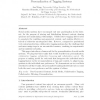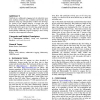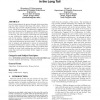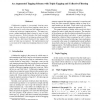112
click to vote
SIGKDD
2010
15 years 13 days ago
2010
Social tagging on online portals has become a trend now. It has emerged as one of the best ways of associating metadata with web objects. With the increase in the kinds of web obj...
116
click to vote
IPM
2010
15 years 15 days ago
2010
Social media systems have encouraged end user participation in the Internet, for the purpose of storing and distributing Internet content, sharing opinions and maintaining relatio...
120
click to vote
WEBIST
2008
15 years 3 months ago
2008
Consumer Generated Media(CGM) is growing rapidly and the amount of content is increasing. However, it is often difficult for users to extract important contents and the existence o...
BCSHCI
2008
15 years 3 months ago
2008
CiteULike is a collaborative tagging web site which lets users enter academic references into a database and describe these references using tags (categorizations of their own cho...
115
click to vote
CSCW
2008
ACM
15 years 3 months ago
2008
ACM
Collaborative tagging systems have the potential to produce socially constructed information organization schemes. The effectiveness of tags for finding and re-finding information...
109
click to vote
CIKM
2008
Springer
15 years 4 months ago
2008
Springer
Social bookmarking is the process through which users share tags for online resources like blogs with others. Such collaborative tags provide valuable metadata for retrieval syste...
151
click to vote
HT
2006
ACM
15 years 8 months ago
2006
ACM
Collaborative tagging systems, or folksonomies, have the potential of becoming technological infrastructure to support knowledge management activities in an organization or a soci...
WEBI
2007
Springer
15 years 8 months ago
2007
Springer
Collaborative tagging is increasingly drawing attentions. However the keyword based tagging scheme has its limitations and it can be observed that tagging society are seeking and ...
122
click to vote
SEMWEB
2007
Springer
15 years 8 months ago
2007
Springer
While the Semantic Web requires a large amount of structured knowledge (triples) to allow machine reasoning, the acquisition of this knowledge still represents an open issue. Indee...
119
click to vote
IAT
2008
IEEE
15 years 8 months ago
2008
IEEE
Collaborative tagging systems have emerged in recent years to become popular tools for organising information on the Web. While collaborative tagging offers many advantages, they ...




